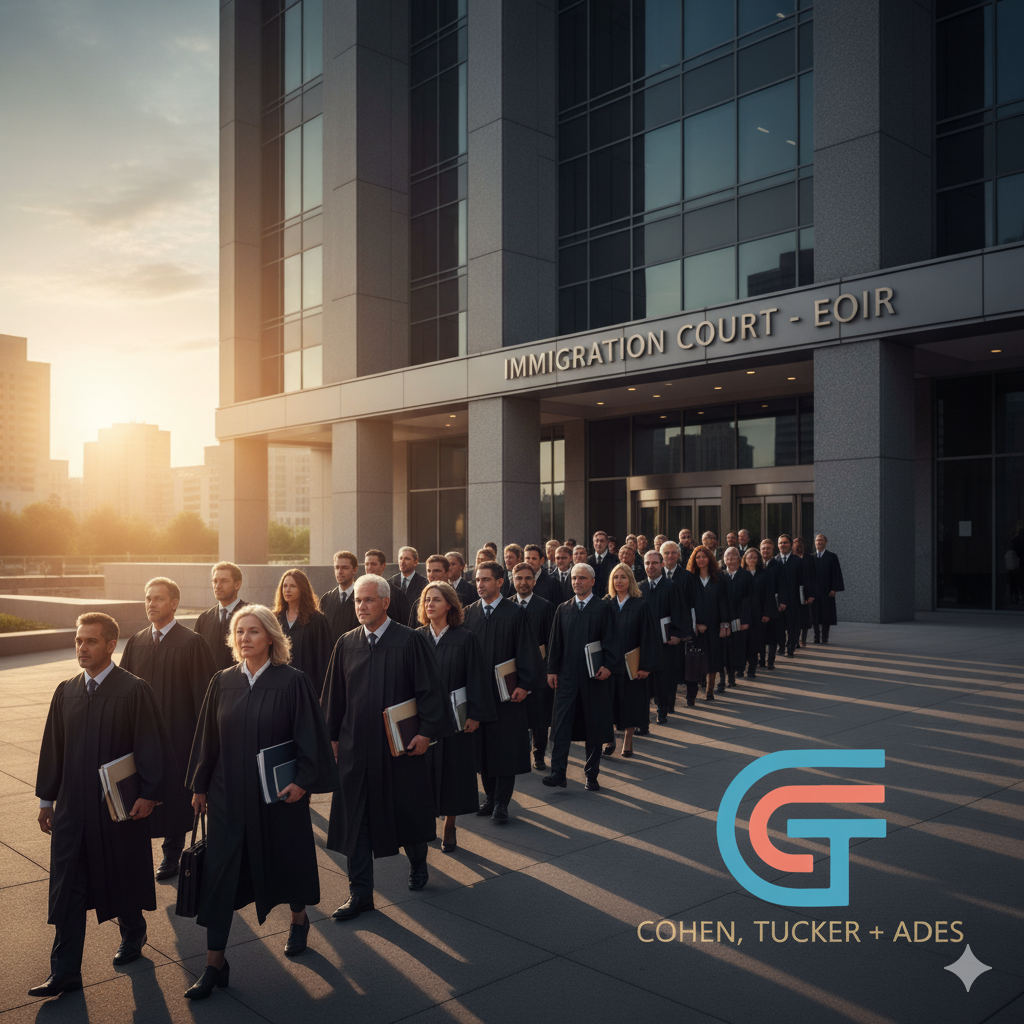New Faces on the Bench: EOIR Appoints 11 Immigration Judges and 25 Temporary Immigration Judges
Authored by Wendy R. Barlow, Esq.

The Executive Office for Immigration Review (EOIR) recently announced the investiture of 11 new Immigration Judges (IJs) and 25 new Temporary Immigration Judges (TIJs), a significant development in the ongoing effort to manage and address the substantial backlog of cases in our nation’s immigration courts. This influx of new adjudicators has the potential to impact both the speed and process of proceedings nationwide.
For our clients and the broader immigration community, understanding the implications of these appointments is crucial.
Addressing the Caseload Crisis
The primary driving force behind the appointment of a large cohort of new judges is the staggering volume of pending immigration cases. The EOIR has stated its commitment to reducing this backlog, and the addition of 36 new judicial officers—including those in temporary roles—is a direct response to this need for increased capacity.
-
Increased Capacity: With more judges available, courts in busy jurisdictions are better positioned to move cases through the system more quickly, potentially decreasing overall wait times for hearings.
-
Wider Geographic Reach: The new judges are assigned to immigration courts across the country, including in California, New York, Texas, Florida, and other states with high-volume dockets. This strategic placement aims to alleviate the burden on the most overwhelmed courts.
The Role of Temporary Immigration Judges (TIJs)
One notable aspect of this announcement is the appointment of 25 Temporary Immigration Judges. This designation is part of a strategy to rapidly onboard judicial resources to address immediate needs.
While the term “temporary” may raise questions, TIJs are fully vested Immigration Judges who possess the same adjudicatory power as their career counterparts. Their appointment underscores the urgency with which the EOIR is trying to tackle the caseload, leveraging all available tools to boost efficiency. However, the use of temporary positions also highlights the ongoing debate regarding the stability and independence of the immigration court system.
What This Means for Your Case
The increased judicial bandwidth offered by these appointments may have tangible benefits for individuals currently in removal proceedings:
-
Faster Hearing Dates: The most immediate and welcome change could be the availability of earlier or more frequent hearing dates, potentially speeding up case resolution.
-
Focus on Efficiency: As the EOIR emphasizes backlog reduction, judges—both new and established—will be focused on docket management. It’s more important than ever to be thoroughly prepared for every hearing, with all evidence and documentation ready well in advance. Motions for continuances may face higher scrutiny.
-
The Importance of Counsel: Navigating an immigration court system undergoing rapid expansion and operational changes is challenging. With new judges whose adjudicatory styles are yet to be fully established, experienced legal counsel becomes invaluable. Our team at Cohen, Tucker + Ades is already reviewing the backgrounds and assignments of the new IJs and TIJs to strategically advocate for our clients.
Cohen, Tucker + Ades: Your Immigration Litigation Partner
While new judicial appointments are a positive step toward increasing capacity, the ultimate success of a case still hinges on meticulous preparation and expert advocacy.
The immigration landscape is constantly shifting—from policy changes to new case law from the Board of Immigration Appeals (BIA)—and the addition of new judges to the system only adds another layer of complexity.
If you have a pending case or anticipate future proceedings, don’t leave your fate to chance. Contact Cohen, Tucker + Ades today to ensure your case is positioned for the strongest possible outcome, regardless of who is sitting on the bench. We’re here to guide you through these crucial legal developments.
(Disclaimer: This blog post is for informational purposes only and does not constitute legal advice. Please consult with an attorney for advice regarding your individual situation.)
Not sure which option is right for you? Request a confidential consultation today.

